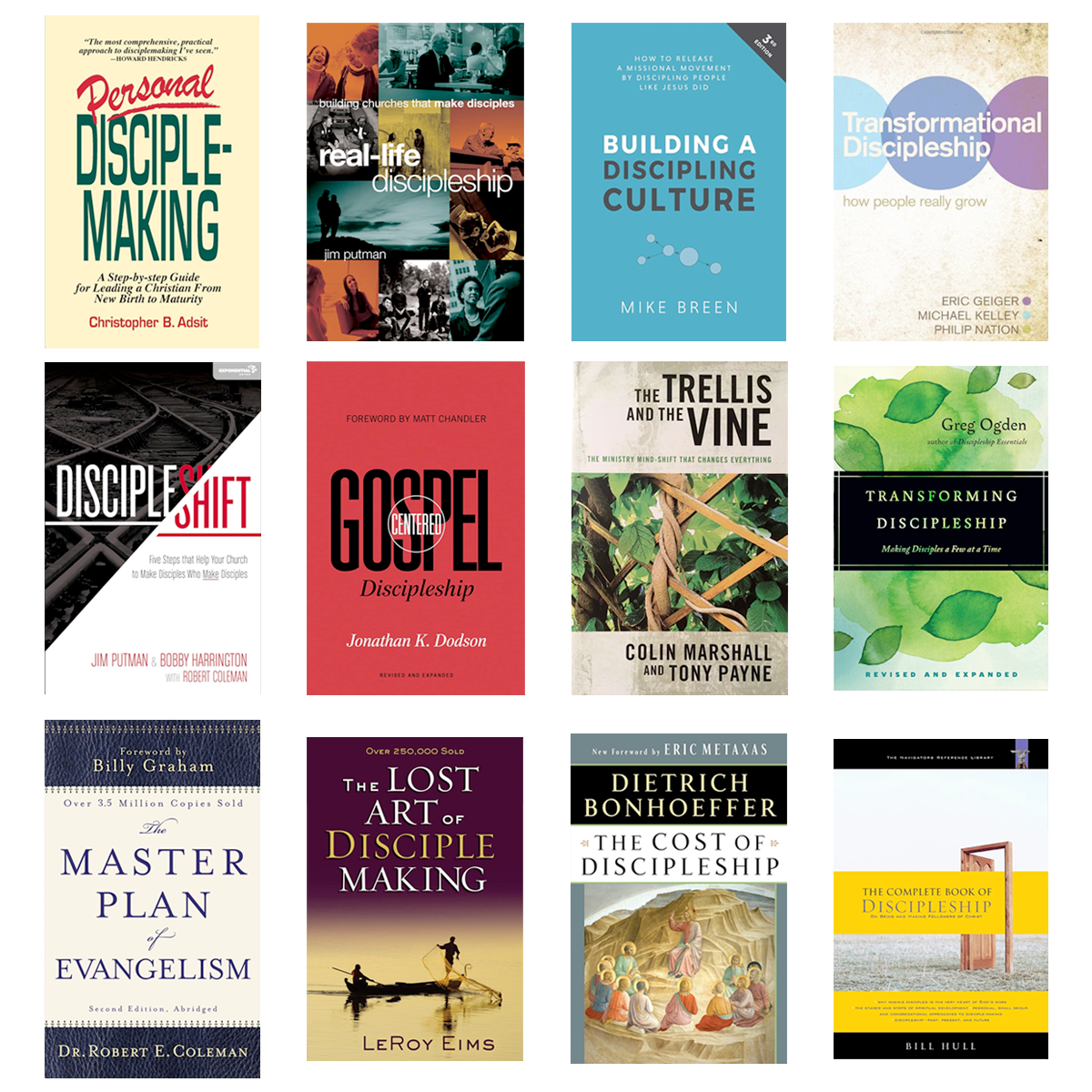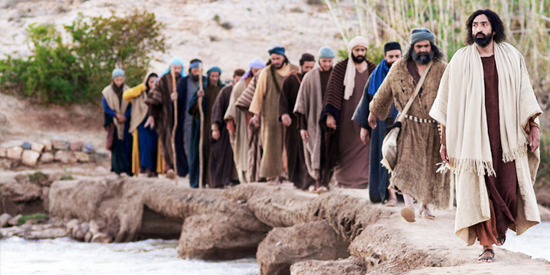Start a D-Group to Maximize your Investment
Now that I have your attention, let me say that one-on-one discipleship is not a waste of time.

However, there is a better way to invest your chronological clout.
Anyone in business will tell you that the secret to success is working smarter, not just harder – because investing your time and resources in the right areas will yield the biggest returns. Solomon, King David’s son, was a financial genius: the Warren Buffett of his day. Twenty-five hundred years before Wall Street ever existed, he advocated the diversification of assets (Ecclesiastes 11:1-2). Wise people do not invest all of their funds in one stock for fear of losing their entire life savings, should the company collapse. Instead, good stewards invest in a variety of stocks, bonds, and commodities.
The same can be said of your time. It’s precious. You only have so many hours each week to devote to discipleship, so invest in the right areas. After a decade of discipling, critiquing, evaluating, and implementing discipleship groups in various contexts and churches, I have identified 8 convincing reasons to start a D-group of 3 to 5 instead of one-on-one.
Discipleship is more than a weekly meeting, but never less. Believers grow spiritually outside of the group more so than during the time spent together each week. However, the weekly meeting is crucial for maturity. The gender-exclusive group meets weekly for a time of encouragement, edification, fellowship, accountability, and equipping.
Eight Reasons to Disciple in a D-Group of 3 to 5
1. Avoid the Ping-Pong Match
In a discipleship group of two, you, the leader, are responsible to keep the ball in play. “Mike, how was your day?” “Good,” responds Mike. “Any insights from your Scripture reading this week?” “I enjoyed it,” Mike briefly replies. The conversation progresses only as the mentor engages the mentee. The pressure to lead is lessened when others in the group join in on the spiritual journey.
2. One-on-one is difficult to reproduce
A one-on-one model can be challenging to reproduce because the person in whom you are investing has a tendency to look at you in the same manner that Timothy looked at the Apostle Paul. Mentees, after a year or two in a discipling relationship, have said to me, “I could never do with another person what you did with me.” On the contrary, a group takes a journey together. As the discipleship journey unfolds over the year, Mike thinks to himself, “If Bubba can do this and Ralph can do this, Maybe I can as well.” It is worth noting that group members usually don’t feel ready to begin their own groups. Neither did the disciples, but Jesus left them with no choice. Remember, the discipling relationship is not complete until the mentee becomes a mentor; until the player becomes a coach.
3. Group of two tends to become a counseling session
A group of two tends to become a counseling session, where you spend the majority of your time solving personal problems. Biblical wisdom for personal issues is certainly a part of the discipling relationship, but therapeutic advice every week must not define the group.
4. A group of three to five has built-in accountability
A group of three to five provides a built-in accountability system. In my first D-Group, two of the three men involved came prepared with a Bible-reading journal I had asked them to complete. But one, a skeptic of the system’s value, failed to make any entries. Prior to joining the D-Group, his excuse for not reading the Bible was, “It’s difficult to understand.” Using the other two men to motivate him, I countered, “Can you just try journaling for the next five days? Right now, you have no evidence to prove that it doesn’t work. By trying it, you will know if it works for you or not.” The next week, he arrived with a smile on his face, saying, “Let me share what I heard from God through his Word this week!” Watching the excitement of the others challenged him to contribute to the group, and to his own spiritual development.
5. A multiplication strategy is exponentially faster than an addition strategy
The D-Group model is designed for exponential growth, which is difficult to grasp for people with short-term vision. It’s hard to look at a mass evangelist, converting hundreds of people at a time, and compare them to someone in a D-Group model, discipling 3 people a year.
Let us examine a hypothetical situation to see the effectiveness of exponential growth. Johnny and Frank find a genie in the desert who grants them each their choice: they can either receive ten dollars a day for the next ten years or they can receive one penny a day, doubled each day, for the next three months. Johnny, being a sucker for a quick buck, quickly shot his hand up and said that he would gladly take the ten dollars a day for the next ten years. Ten dollars versus one penny?
Psh. A no-brainer. Frank was a bit more cautious, though. After carefully considering his options, he said he’d take the other option: one penny a day, doubled, for three months. Johnny looked at him like he was an imbecile. The genie wished them well and then poofed them back to their homes. The next day, Johnny woke up and found ten dollars next to his bed. He used it to buy lunch on his break that day. Frank woke up and found a penny. He smiled and put it in a jar in the corner of his room. On day two, Johnny awoke again to ten dollars – an occurrence he was going to surely get used to over the next ten years. Ten years’ worth of free lunches? He was fine with it. Clearly, he made the right decision. Frank woke up to find two pennies. This continued on for a while. Each day, Johnny awoke to ten dollars next to his bed, Frank to a growing pile of pennies. On day three, it was four pennies. Day 4, 8. Day 5, 16. Day 6, 32. He found out that he would need a bigger jar extremely quickly, because come day 21, he had a pile of 1 million pennies in his room that wasn’t there the day before. By day 28, he was getting over a million dollars every day. It is the same with people.
If an evangelist reached 1,000 people each year, in 6 years he would influence 6,000 people. If a disciple maker followed an exponential model, where those he disciples go and disciple 3 more people after a year, he will have influenced 19,683 after 6 years. And these are just the numbers of one disciple maker. If we added up every disciple maker’s influence in this process, every person on the planet would be reached multiple times over after 30 years.
This is the beauty of a ministry shift from a strategy of addition, where the clergy performs the ministerial duties, to one of multiplication, where believers are expected and equipped to personally participate in the Great Commission. If pastors could grasp this concept, our churches would change immediately. Discipleship must be the ministry of the church and not a ministry of the church for discipleship to take place in the church.
6. A one-on-one group can be intimidating
Have you ever sat across the table from a person of the same sex with the goal of penetrating the hard outer coating to expose the deep dark secrets of your life for the next hour and a half? Oh, and by the way, we will do this for the next 12 months. Your palms may be sweating now just thinking about that. For men, the thought of that may strike panic in their hearts with the same intensity as speaking in front of a crowd of 300 people. The insertion of others diminishes the gap of consternation in participating in disciple making.
7. You grow as a group
Humans are fallible creatures. Even with the best study, we can be led astray. Would you prefer to tackle difficult texts with just one other person rather than with a group? Scripture was meant to be studied in a group, for when there are others in the group, you guard against teaching something unintentionally unbiblical – you balance each other out. An added benefit of group learning is that multiple minds growing with a similar goal will highlight different aspects of the Word that speak to them that the others might not have recognized at first. Individual growth in a group setting serves not to just help the individual growing, but the people who are growing around him.
8. Jesus Discipled in Groups
Jesus’ example is the final nail in the construction of our case. If we are called to be followers of Christ, should we not also be replicators of His methods? Jesus preached to the multitudes on a few occasions, but that was not His typical outreach tool. He poured His time into a small group, who would then go on to change the course of human history. The Babylonian Talmud, a commentary on the Old Testament, cites the importance of group learning, “Much have I learned from my teachers, even more from my haverim, but from my disciples, most of all.”[i] Jesus believed in diversified investing and modeled it in His discipleship example.
Joel Rosenberg and T.E. Koshy pose a thought-provoking question: “What if for three years Jesus had discipled only Judas? Despite his best efforts, Jesus would have wound up with no one to carry on his legacy and his message when he returned to the Father. Jesus didn’t invest in just one man. He invested in a group of men from a wide range of backgrounds, including fishermen, a tax collector, and a Zealot (a political revolutionary).”[ii] Instead, Jesus poured Himself into twelve men, and, in so doing, taught us the importance of the group in disciple-making.
Yes, there are times when a one-on-one mentoring relationship is beneficial; but in the New Testament, particularly the Gospels, it is not the norm. Do I ever Disciple someone in a one-on-one context? Absolutely, I do it all the time. However, I meet with people individually out of the group, never in place of the group. Group members ask me to join them for breakfast or lunch to discuss personal issues in their jobs, marriages, or personal lives. Often I stay after the weekly meeting to offer counsel and encouragement. For the most part, issues can be discussed within the group over time, but some issues need to be discussed in private. The individual decides what level of transparency he or she is comfortable with.
Now What? Most believers have a desire to meet in a discipleship group but don’t know where to begin or what material to use. Sadly, many believers suffer from analysis paralysis, and when they don’t know what to do, they don’t do anything at all.
Here are two downloads that will help.
Road Map Our Replicate Team has just released a handy resource called The Discipleship Pathway that you will want to print out and refer to throughout the year. You can download all 3 options: a bookmark, a 5 x 9 front and back, or a full sized 8 ½ x 11 page. In it, you will discover how to begin a D-Group, the 5 factors that evaluate the health of a D-Group, 4 daily disciplines that every disciple should engage in, and the 3 that enable a church to grow exponentially. Click here to download it.
Perhaps you don’t need to be persuaded to start a D-Group; you merely need to be reassured that you can do it! Well, the Growing Up Challenge that problem. No longer can you use the excuses, “I don’t know how to lead a group because I’ve never seen a group!” or “I don’t know what to teach because I’ve never been discipled! When is the best time to begin a group?
NOW! The Growing Up Challenge uses my book Growing Up as a manual for making disciples, and the Challenge gives you access to hours of videos, outlines of material, downloadable discipleship PDF’s, and tools that provide step-by-step training for investing into others. Growing Up as a manual for making disciples, I will outline the first thirteen group meetings for you. In the comfort of your home, you can access videos that provide step-by-step training for investing in others.
If you are interested in the Growing Up Challenge, visit https://growingupchallenge.com to sign up. It’s FREE.


